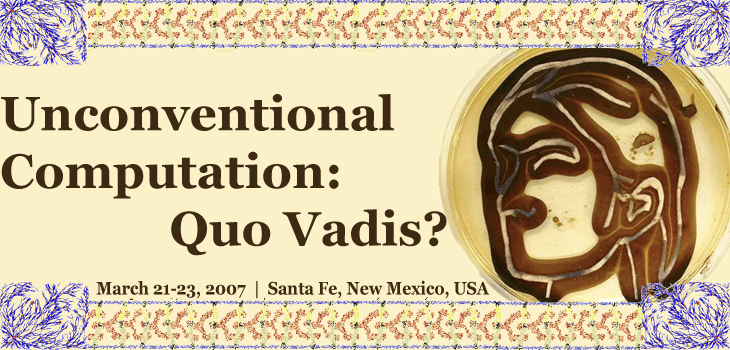
This workshop is organized and sponsored by the Center for Nonlinear
Studies (CNLS) at Los Alamos National Laboratory (LANL),
with additional support from the Modeling, Algorithms & Informatics
Group (CCS-3) of LANL and the Santa Fe Institute (SFI).

*Image Credits: see below
Invited
Speakers:
Andy Adamatzky (U. West of England)
Howard Barnum (Los Alamos)
Jake Beal (MIT)
Ann Bouchard (Sandia)
Leon Chua (UC, Berkeley)
Eric Drexler (Nanorex)
Chris Dwyer (Duke)
Jean-Louis Giavitto ( CNRS / Evry)
Seth Copen Goldstein (Carnegie Mellon)
Fredric Gruau (U. Paris Sud)
Norman Margolus (MIT)
Jonathan W. Mills (Indiana)
Steen Rasmussen (Los Alamos)
Hava T. Siegelmann (U Mass, Amherst)
Michael L. Simpson (Oak Ridge)
Darko Stefanovic (U New Mexico)
David H. Wolpert (NASA Ames)
Erik Winfree (Caltech)
Klaus-Peter Zauner (U. of Southampton)
Organizers:
Christof Teuscher (LANL)
Francis J. Alexander (LANL)
Ilya Nemenman (LANL)
Gregory Johnson (LANL)
Chris Wood (Santa Fe Institute)
Contact:
Adam Shipman
505-664-0187
conferences@cnls.lanl.gov
A special issue of the Physica D journal is currently in the
works and is expected to be published in Spring 2008.
Unconventional computation is an interdisciplinary research area with the main goal to enrich or go beyond the standard models, such as the von Neumann computer architecture and the Turing machine, which have dominated computer science for more then half a century. This quest, in both theoretical and practical dimensions, is motivated by the huge gap between information processing in nature and in artifacts and by the hope that certain challenges that computational sciences face today might be tackled efficiently by alternative paradigms. For example, developments in synthetic biology, biochemistry, neuroscience, or optics, show that complex computations are omnipresent in physical systems, but that they cannot always be easily described or reproduced in the context of standard computing models. Given a physical, biological, or chemical system, the question is whether such a system computes, and if yes, then what and how? What are the limits and characteristics of such a computation? and how could we "exploit" and "program" the system to perform a specific task in an efficient manner?
The purpose of this workshop is to bring together a multidisciplinary core of scientists who work in the broad field of unconventional computation, to highlight state-of-the-art research in each subfield, to focus on the above-mentioned questions, and to delineate promising future research directions. Both theoretical and experimental contributions will be covered to further the dialog and to foster collaborations. Particular light will be shed on the capability of unconventional computers to solve large-scale real world problems and to eventually outperform classical paradigms. The workshop shall help to further what is generally considered unconventional today into something conventional tomorrow.
The single-track program will be anchored by about 20 invited talks by leading researchers and by a limited number of shorter talks and posters, selected from contributed submissions that describe novel and significant advances in the field.
Neural Computation Workshop: The Santa Fe Institute is sponsoring a half-day workshop on Neural Computation as part of the general theme of the conference. The Neural Computation workshop will bring together experimental neuroscientists, computational neuroscientists, and computer scientists to ask "Does the brain 'compute'?". If so, "In what sense?". If not, "What forms of non-computational information processing does the brain perform?". Are there "computational primitives" for the brain that represent first-level abstractions for the brain in the same sense that binary arithmetic and Boolean algebra are "computational primitives" for Von Neumann architectures?
Publication: The journal Physica D will publish a special issue after the workshop with selected contributions from both invited speakers and the contributors. Contributions are by invitation only and will be peer reviewed just like any regular submission to the journal.
* Links to Related Events:
-
Conference on Unconventional Computing, Bristol, UK, Jul 12-14, 2007, Website
- 6th Int. Conference on Unconventional Computation, Aug 13-17, 2007, Website
- 5th Int. Conference on Unconventional Computation, 2006, Website
- The Grand Challenge in Non-Classical Computation International Workshop, 2005, Website
* Image Credits: Illustrations kindly contributed by De Lacy Costello (c) 2005; Bachrach & Beal (c) 2006; Coore (c) 1999.
This workshop is organized and sponsored by the Center for Nonlinear Studies (CNLS) at Los Alamos National Laboratory (LANL), with additional support from the Modeling, Algorithms & Informatics Group (CCS-3) of LANL and the Santa Fe Institute (SFI).
